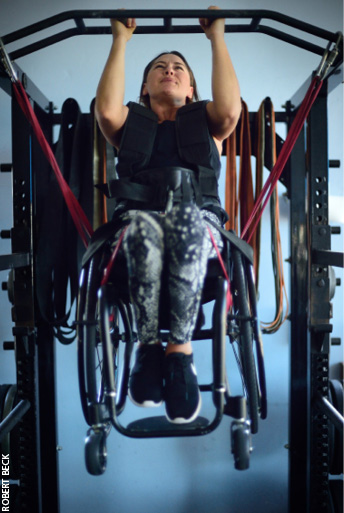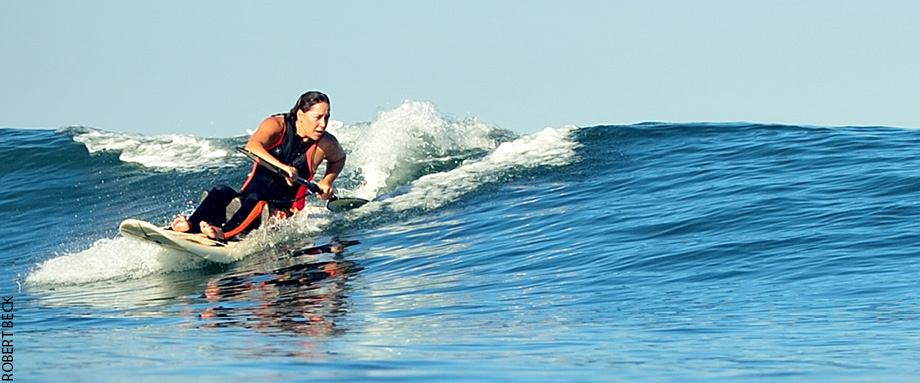“I’m an adrenaline person,” says Alana Nichols, who’s training to compete in sprint kayaking at the Rio de Janeiro Paralympics this September. Nichols already is the first American woman to win gold medals in both the summer and winter games (in wheelchair basketball and alpine ski racing, respectively). In doing so, she has triumphed over competing athletes as well as the despair of a paralyzing injury as a teenager. “I picked up my life and started over,” Nichols says.
Even as a kid, she was always up for a challenge. She participated in organized sports while growing up in New Mexico and set her sights on receiving a softball scholarship for college and also competing in that sport at the Olympics.
A fateful day in November 2000 changed all that. The 17-year-old high school senior attempted a snowboard backflip and “landed on a rock that was underneath the snow. I did that backflip as hard as I could and basically over-rotated it. I broke my back in three places and was paralyzed upon impact.”
She had to relearn everything, from getting out of bed to dressing herself. “It was a terrible, hard time. When I was lying in the hospital bed, I couldn’t imagine being happy again… being able to feel like an athlete again and like somebody who had a reason to live.”
Related: 17 Quotes to Help You Find Your Happiness
But one day at the University of New Mexico gym, she discovered that reason. Catching a glimpse of a wheelchair basketball team, she became intrigued by the players’ athleticism and aggressiveness. “It planted the seed of hope in my heart that I could be an athlete again.”

Nichols says the crucial first step was seeing opportunity. “The second was that I started being open to women’s basketball and the possibilities of playing and being happy in life, and all the doors started flying open.” One door led her to transfer and play basketball on an athletic scholarship at the University of Arizona.
She polished her dribbling, passing, shooting and defense, making the team in 2003. That same year she went to Paralympic tryouts in Pennsylvania. There Nichols (an alternate to the 2004 U.S. team) met someone who would become a role model and her best friend: Patty Cisneros Prevo, who had broken her back in a car crash five years before Nichols’ injury. “I was blown away by how Patty had embraced herself and how excited she was to be alive, getting her master’s degree in teaching and traveling the world as a basketball athlete.”
Following Cisneros Prevo’s example, Nichols shifted her mindset from insecurities about her physical abilities to a laser focus on what she still possessed. “I had my arms, which were working, and my knowledge of the game. There were opportunities in front of me to play basketball at a Paralympic level. Patty was a huge inspiration.”
Cisneros Prevo, a two-time gold medalist (at the 2004 Paralympic games in Athens and 2008 games in Beijing), says Nichols’ athleticism and grit were the keys to her turnaround. “She is an incredibly strong person. From a young age, she developed perseverance and strength. When you’re faced with a tragic event, ultimately the person you are will shine through,” Cisneros Prevo says. “She is fearless, humble and positive.”
Related: Mission Impossible
After Nichols received her bachelor’s degree in education from Arizona, she moved halfway across the country to earn a master’s degree in kinesiology from the University of Alabama. She played wheelchair basketball on the Crimson Tide women’s team.
In 2008 Nichols competed at the Beijing Summer Paralympic Games. She won a gold medal in “a perfect season, a dream come true after five years of training.”
Up for a new challenge later in 2008, she relocated to the Rocky Mountains to pursue alpine ski racing. With that came lots of bumps and bruises. But again her hard work was rewarded: After winning races leading up to the Vancouver Winter Paralympic Games in 2010, Nichols had accomplished the necessary steps to make the U.S. Paralympic ski team.
Then tragedy struck: Her older brother D.J., who had always encouraged her athletic pursuits, was murdered. “I was so beside myself that I just didn’t want to do anything,” she says. Nichols forced herself to train every day on the mountain. At one point, she crashed three consecutive times because her goggles, “sopping-wet with tears,” impaired her vision.
Nichols ultimately skied in her brother’s honor, knowing that he would have cheered her as he always had before. “I felt like he was an angel and was there for me. I couldn’t lose! I didn’t win all the golds [she won two, plus a silver and bronze], but I couldn’t have done any better.”
Nichols says that after she won her first gold with the basketball team, she felt a sense of relief after anticipation, anxiety and desire for five years. But striking gold the second time? “It was about my brother, and it was like he was there—so spiritual. To win and see your name at the top of that scoreboard hits you like a ton of bricks, then you’re in shock, then you try to process it, and it’s all on camera. Tears.”
After living in Colorado’s consistent cold and an elevation of 10,000 feet for seven years, Nichols moved to warm, sea-level San Diego to start from scratch in conquering sprint kayaking.
Per her usual preparation regimen, Nichols simultaneously sets micro and larger goals, seeing the big picture and building from the bottom up. “I need weekly goals to stay on track, and I need to have that long-term gold medal in the back of my mind.” Cisneros Prevo says her friend strategically paves the path to every goal, putting “everything in place so she can achieve it…. She surrounds herself with people and places and things to be the best that she can.”

Nichols does weight training in addition to three hours of kayaking a day to master the 50-second, 200-meter sprint. “It’s a lot of explosive workout stuff,” says Nichols, who also squeezes in time for personal appearances and speeches in exchange for financial support from her sponsors.
Mental preparation is as important as physical. For instance, to calm and control her emotions, she does deep breathing. Visualization and goal-setting are other vital components. “Before the start of a race, I physically see myself in my mind practicing all my techniques and winning the race.”
What’s next? After Rio, Nichols hopes to write a book as well as assist in research about spinal cord injuries and cures. “It’s fun to think about walking. I hope I can be part of a human trial.”
Related: What Happy, Successful, Optimistic People Know About Life
This article originally appeared in the June 2016 issue of SUCCESS magazine.





